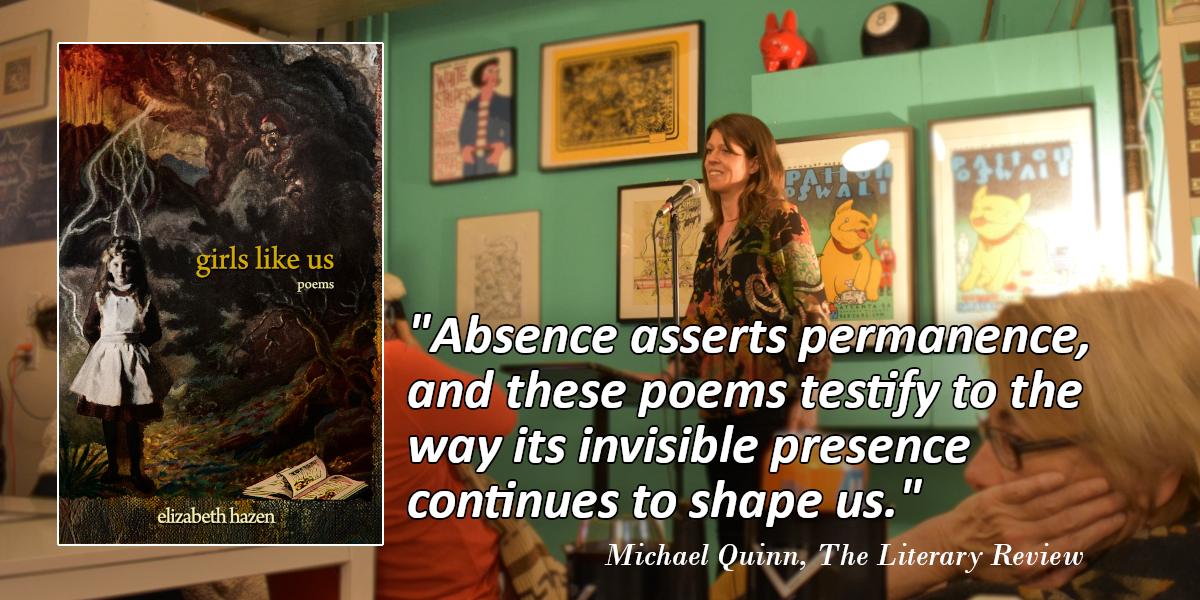TLR Delivers a Stellar Review of GIRLS LIKE US
Michael Quinn of TLR traces the arc of Elizabeth Hazen's new collection "The Last Girl" and discovers the ways in which "Absence asserts permanence."

A new review this week from The Literary Review traces the arc of Elizabeth Hazen's Girls Like Us from a "[focus] primarily on the self, [to] poems [that] are gradually consumed by a responsibility to others, primarily through motherhood and its all-consuming need to provide for and protect."
Motherhood, womanhood, girlhood, addiction, and identity all present themselves in different ways throughout this arc, and Brooklyn-based reviewer Michael Quinn deals deftly with each of them, analyzing bits and pieces of many poems which tell the story of Girls Like Us rather than lingering too long on one or two images. In doing so, Quinn is able to depict Girls Like Us as a book that refuses pigeon-holing and which dares to be complicated and often difficult.
This dedication is evident in Quinn's description of the cover of the collection, a collage by Lindsay Fleming, "Near the girl’s feet, a book lies on the ground with its pages blown open. An adventure awaits: dangerous, scary, exciting, confusing." And, in a more detailed way, it is evident in Quinn's short but revealing analyses of the Hazen's Diagnosis cycle:
'“Diagnosis I,” “Diagnosis II,” and “Diagnosis III” respectively depict three scenes. In the first, an unwell woman is assured by her male doctor that despite her undiagnosed source of pain, there’s nothing wrong with her. In the second, a young virgin’s group of male tormentors becomes her booze-supplying seducers. In the third, the past of a woman at midlife is thrown into relief when a drunk aggressively hits on her. “Girls like / you, he repeated, leaving me / a blank to fill.”'
Talking Jazz and Rock with Poet Reuben Jackson (Laura Ritchie)
Author and music educator Lauren Ritchie sat down with ASP’s Reuben Jackson this week to talk jazz with the man himself. Reuben’s music credentials are long and impressive, from curating the Duke Ellington Collection at the Smithsonian to hosting a weekly Jazz radio show for NPR Vermont, to his poetry which takes inspiration from and frequently comments on the American Jazz idiom. Listen to or read the interview…
Rose Solari talks with Acclaimed Poet David Gewanter
This Sunday, October 21, at 8 p.m., ASP’s Rose Solari is reading with acclaimed poet, essayist, editor, and professor David Gewanter in a new poetry reading series at Second Story Books, 2000 P Street NW, Washington DC. In preparation for their reading, Rose talked with David about his work, particularly his most recent collection, Fort Necessity. Here is a part of their discussion…
Featured Audio: “Margaret in Oxford,” a Reading by Rose Solari
Robert Olen Butler loved Rose’s debut work of fiction for its sense of the eternity. This is one of many reasons why all of Rose Solari’s work must be treasured. It plays on life motifs, flips, forms, and languors upon the archetypes formed of human experience. We have spoken previously of Rose’s reverence for the myth in modern day. We even looked before at A Secret Woman’s sense of itself as being both poem and novel…

